Mary Anne Yarde's Blog: The Coffee Pot Book Club , page 167
October 25, 2018
Life in the time of Cinaed Mac Alpin by Anna Chant #History #Scotland @anna_chant
Life in the time of Cinaed Mac AlpinBy Anna Chant
Scotland in the 9th century was… well, to start with it was not called Scotland. Much of what we now call Scotland was the land of the Picts, while in the west was the Kingdom of Dal Riata, peopled by the Scots and to the south was the Kingdom of Alt Clut or Strathclyde, as it came to be known. For much of the population it would have been a basic existence, living in small dwellings such as these crannogs, with agriculture very much at the mercy of the Scottish weather. For the nobility life was less basic. The lochs and seas then, as now, were fertile fishing grounds and they would have enjoyed the thrills of the deer hunt.
 Crannog.
Crannog.But this was no isolated, cultural backwater.
 Dunadd Fort.
Dunadd Fort.There is evidence of trade with the rest of Europe at hill forts such as Dunadd in Argyle, where the presence of a footprint on a rock hints at an ancient kingship ritual. In carved stones, which survive to this day, we can see the work of skilled craftsmen, while abbeys were centres of learning, the most famous being the abbey founded by Saint Columba on Iona where the beautiful Book of Kells was at least begun.
 Carved Cross
Carved CrossToday the Scottish countryside is the epitome of peaceful tranquillity, but 9th century Scotland, like much of Europe, was under Viking attack. It would be easy to imagine this as plucky Scots resolutely standing up to the Vikings but the truth is more complicated. There is evidence Cinaed Mac Alpin (Kenneth I) was at one point in alliance with Vikings, while his brother and successor, Domnall (Donald I) is described as the son of a foreign wife, suggesting that he and Cinaed were half-brothers, with his mother of Norse origin. Cinaed’s son, Causantin (Constantine I) allied himself with the Viking, Ivar the Boneless, in his conflict with King Artgal of Strathclyde. These alliances aside, there are many records of raids on the coastal settlements, including Iona and we can only begin to imagine the panic these must have caused. Even those who never experienced it must have lived in dread of attacks.
 Iona.
Iona.The fears of the people proved to be well founded as the Viking raids culminated in the shattering battle of 839, one of the bloodiest ever fought on British soil. Both the Scot and the Pict king were killed as were vast swathes of the nobility. And it was from this chaos that Cinaed Mac Alpin emerged.I once, somewhat irreverently, described Cinaed as a ‘Dark Age poster boy’ and perhaps it’s time to explain exactly what I meant. The term ‘Dark Ages’ has fallen out of favour with historians. Once it was used to describe the brutal, ignorant time between the glories of ancient Rome and the splendours of the Renaissance. We now know better. This was a time with its own laws, learning and culture and was no more brutal than any other age including, perhaps, our own.But I like the term and use it to describe the era in its most literal sense – dark as in ‘hard to see’, which it is. Crumbling ruins, archaeological finds and medieval chronicles illuminate parts like candles in the darkness but like candles, they throw up strange shadows and distortions, giving rise to the many legends of the era. Cinaed Mac Alpin is an excellent example of this.He is a historical figure, born around the year 810. Traditionally he is believed to have been of both Pict and Scot descent, although the identity of his mother is not known. Nor is that of his wife, the subject of my first book. He likely became King of Dal Riata in 839, perhaps one of the last kings to take part in the footprint ritual at Dunadd. He gained the Pict crown a few years later when he was the first known king to be crowned at Scone, setting a tradition which would last until Charles II in 1651. He also started an even longer tradition when he brought the Stone of Destiny to Scone. This mysterious stone, said to have been the pillow of the Biblical Jacob, continues to be used in British coronation rituals to this day.
 Dunadd Footprint.
Dunadd Footprint.Cinaed was certainly a man of war, a formidable warrior who invaded Northumbria several times, yet he was also the man who founded Dunkeld Abbey and brought the relics of Saint Columba there for protection. He appears to have been a successful and popular king with his death from natural causes recorded with sorrow in 858 in the Annals of Ireland. Because Cinaedwith his host lives no longer
there is weeping in every house;
there is no king of his worth under heaven
as far as the borders of RomeBut Cinaed was not just a historical figure. He is also a king of legend. He is The Hardy! The Conqueror! The Uniter! With his reputation for uniting the Picts and Scots and with Scottish monarchs numbered from him, he can claim to be Scotland’s founding father, a title which I am sure would have bemused the real man. His legends range from the glorious: He is said to have fought alongside his grandfather, King Eochaidh the Venomous, at the Battle of Athelstanford where the cross of Saint Andrew appeared in the sky to unite the Picts and Scots.

To the bloodthirsty: Mac Alpin’s Treason is one of Scotland’s Black Dinners, where Cinaed is said to have treated his rivals to some boozy revels before disposing of them in a brutal fashion.To the bizarre: Did he really use fish skins to disguise himself as an angel to command his lazy warriors to obey him?Can there be truth in any of these legends? The answer to that is lost to time, but this is Scotland, the land of kelpies and selkies, where even today people scan the dark waters of Loch Ness, hoping for a glimpse of a fabulous beast. Surely anything is possible!
Kenneth's Queen:A nation everyone remembers, a woman everyone forgot...(Women of the Dark Ages Book 1)
 She was present at the birth of a nation.Her descendants sit on the British throne to this day.But history does not even record her name…
She was present at the birth of a nation.Her descendants sit on the British throne to this day.But history does not even record her name…In ninth century Britain, the Picts and the Gaels are fighting for supremacy over the North. In one of their rare truces Baena, a young Pict woman is reluctantly married to a Gael warrior, son of one of the great Chiefs of Dal Riata.
Leaving behind her family and the Pict lord she had hoped to marry she travels west to the household of Alpin, where she is viewed with suspicion by many of her new kin. The collapse of the truce and the indifference of her husband leaves her position in her new land increasingly vulnerable, as war breaks out once again. Forced to forget her Pict heritage, she fears the day when she will have to make an agonising choice between the victory of her husband or her father.
Her journey will take her from the splendours of the Fortress of Dunadd to the tranquillity of the sacred Isle of Iona, where even greater danger lurks as the terrifying Norsemen plan their own attacks. However it seems her hardest battle will be to win the heart of her husband, the brave, cunning and often ruthless Cinaed as he fights his way towards a destiny that could be greater than anyone imagines…
The man known to history as Kenneth Mac Alpin
Excerpt
An excerpt from Kenneth's Queen - the recent marriage of Cinaed to his Pict bride is not going well...
She stood with her head bowed while Cinaed looked impatiently at her. Sighing, he reached out and took her hand. Baena was unable to help her reaction at his touch. She flinched and Cinaed dropped her hand, a look of rage spreading across his face.
“Ah, yes. I know your tastes run to a very different man,” he started in a low, angry voice. “But there shall be nothing of that nature here. I will not have my name disgraced. If you do not behave with honour and propriety at all times, you will be punished in full accordance with our laws. I trust you understand this.”
Baena nodded fearfully, although she had no idea how their laws stood on such matters.
“It is clear to me that you were allowed to run wild back in your land. That is now at an end. Here we work hard and you will be expected to bear your share. I will have no man say that the Lord Cinaed has a lazy, slattern for a wife.”
Baena’s resentment built up at the injustice of his words. She had never shirked her duties and was no stranger to the hard work needed to keep these great forts running.
Cinaed folded his arms and looked at her with narrowed eyes. “I have indeed made a very poor bargain. From this day you will strive harder to please me.”
Amazon UK • Amazon US
Anna Chant
 Anna Chant is a writer and mother of three from Torbay, South Devon. She grew up in Essex before moving to Yorkshire to study history at the University of Sheffield. In 2015 inspired by her love of history and her Scottish ancestry, Anna started writing her first book. Kenneth’s Queen, the tale of the unknown wife of Kenneth Mac Alpin, was published the following year. Anna has fallen in love with the Dark Ages and especially the part played by the often forgotten and uncelebrated women of the era. She plans to tell the stories of as many as possible! Anna loves to hear from readers, you can find her : Blog • Facebook • Twitter.
Anna Chant is a writer and mother of three from Torbay, South Devon. She grew up in Essex before moving to Yorkshire to study history at the University of Sheffield. In 2015 inspired by her love of history and her Scottish ancestry, Anna started writing her first book. Kenneth’s Queen, the tale of the unknown wife of Kenneth Mac Alpin, was published the following year. Anna has fallen in love with the Dark Ages and especially the part played by the often forgotten and uncelebrated women of the era. She plans to tell the stories of as many as possible! Anna loves to hear from readers, you can find her : Blog • Facebook • Twitter.
Published on October 25, 2018 23:00
October 24, 2018
Have you heard the one about a dead horse, a German beer and a Bernard Cornwell book? By Dominic Fielder #Napoleonic #HistoricalFiction #mustread @Kings_Germans
Have you heard the one about a dead horse, a German beer and a Bernard Cornwell book?
By Dominic Fielder
 I can’t claim to be one of those people who has had a burning ambition to write a book, although I count myself very lucky. For sixty years and counting, my family has run a small bookstall in Plymouth. I’ve been surrounded by other people’s stories in print, for as long as I can remember.
I can’t claim to be one of those people who has had a burning ambition to write a book, although I count myself very lucky. For sixty years and counting, my family has run a small bookstall in Plymouth. I’ve been surrounded by other people’s stories in print, for as long as I can remember. Every Saturday, in my early youth, I could earn a very reasonable amount of pocket money, helping my dad. My main interest, girls aside (it certainly wasn’t school work), was the world of little model soldiers. A trip to WH Smiths on the first floor was a chance to spend Saturday’s wages before the bus ride home. There was the most incredible display case, rammed with Romans and Gauls, cowboys and indians, and British Redcoats fighting just about everyone! Somewhere in that store, there was a book display but it seemed disloyal and outlandish to buy a new book. Besides within days or weeks, these titles would drift in and I could take my pick.
And one day I had that moment, that book that changes the direction of your life. Maybe that’s too dramatic but from that point onwards I scoured WH Smith’s shelves. I couldn’t wait! I needed that next fix of story!
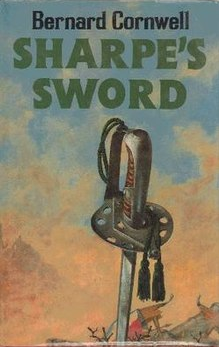
For over thirty years I consumed these stories, Sharpe in particular! Then the feeling of wanting to a story emerged. There are lots of reasons why, most are too personal to share but each time and sat and reasoned the matter through, I came to the same conclusion. I couldn’t write a Sharpe story anywhere near as well as Bernard Cornwell could. Now, at this point I know that you are streets ahead of me. I didn’t have to be Bernard Cornwell…Bernard Cornwell is Bernard Cornwell! I just needed to find my own voice, my own niche. Write it well and people will read it. And even if no-one ever reads it, write it well for your own satisfaction!
I’m going to tell you now that I have a degree in History, not that I’ve been trying to work it into the article but in studying for the degree I discovered a love for research, borrowing books from the library that hadn’t seen the light of day since the mid-eighties. Often, the line of inquiry would fizzle out but every now and then, I’d unearth a gem. Searching for a story to tell, MY story to tell, had the same intoxication as university research had given me. Chasing down ideas and articles, I found myself reading an obscure link to a ‘Hanoverian Cream’.

Not some bizarre ointment but the horse of choice for royal carriages, the Hanoverian Cream served George III and Victoria, and undoubtedly other monarchs. During the Second World War the breed became extinct. As sad as that is, that wasn’t the story that caught my attention.
When Hanover was invaded in 1803, the Royal Stud at Celle had been captured. Most of the breeding stock had been spirited away but somehow, a few Hanoverian Creams were left behind. The horses were presented to Napoleon and those spoils of war drew his state carriage to Notre Dame for his coronation as Emperor, a year later. How best to cement the status as the de facto monarch of France than use that symbol of British monarchy. It is a safe to assume that King George was somewhat disapproving of such an act. He forbade the use of Hanoverian Creams to pull his state carriage until Napoleon had been removed from power. His new horses were black, perhaps a statement of mourning for the very notion of Kingship that the ‘scoundrel Bonaparte’ had devalued in the careful reconciliation of State and Church, that his imperial coronation sought to deliver.
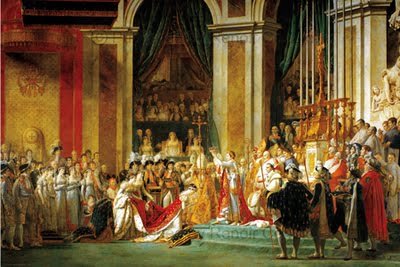
From this, sprang a story, about the horses left behind. those that escaped, the soldiers who fought in the shambolic events of 1803 and the capitulation of Hanover. I began to flesh it out, not really knowing what I was doing but the ideas kept flowing: a tap wrenched open. There was only one major problem, there were to be plenty of problems but on that summer holiday in Hanover, I didn’t have a clue about those yet and they are very much for articles to come.

There’s that moment in Raiders of the Lost Ark where Indy and Sallah have that realisation that the Nazi archaeologists are digging in the wrong place. It’s not an analogy you want to share out loud in a German hotel bar but I shared it with my long suffering girl-friend of the time. I would tell the story of the soldiers who chose to leave their country, arrive in Britain and form the King’s German Legion. 1803 could have been the start of that story but my research had thrown up the involvement of Hanoverian soldiers in the earlier campaign of 1793, in Flanders. Rather than have a series of flash back stories, Flanders was the place to start, the fertile ground to dig. There were few stories of the Revolutionary War that I could think of and it was a period of history that I was largely ignorant of. The chances were, that other readers were too.
What’s more, I had these ideas for characters and now I could tell their story without the need to weave it into events in the Peninsular War. The King’s German Legion could live and breathe, in the days when they were just the King’s Germans.
But I still needed a name for a central character. I sipped from a beer bottle in silent contemplation. Something about the label caught my eye. The beer was first brewed in 1803. It felt like a sign. My thumb covered up the last two letters of the Krombacher beer…and Sebastian Krombach was born.
He isn’t Sharpe. He doesn’t have to be.
Sebastian Krombach, Captain Werner Brandt, Erich von Bomm and others, live and breathe of their own accord. You probably don’t know them yet; I hope that one day you do!
I’ve committed myself to tell their stories, across twenty-two years of history. I had better get moving. It’s taken me a long time to realise that I don’t need to be that pale imitation of someone else. I just need to tell the King’s Germans’ stories and they will speak for me.
The Black Lions of Flanders (The King's Germans)

In the war of the First Coalition, friend and foe know one simple truth: trust your ally at your own peril.
February 1793.
Private Sebastian Krombach has joined the army to escape the boredom of life in his father’s fishing fleet. Captain Werner Brandt yearns to leave his post and retire into civilised society and Lieutenant Erich von Bomm wants nothing more than to survive his latest escapade that has provoked yet another duel. Each man is a King’s German; when they are called to war, their lives will become inextricably linked.
The redcoats of the 2nd Battalion, 10th Regiment, must survive the divisions that sweep through their ranks before they are tested in combat. On the border of France, the King’s Germans will face an enemy desperate to keep the Revolution alive: the Black Lions of Flanders.
Amazon US • Amazon UK
Dominic Fielder
 Dominic Fielder (1968-present) was born in Plymouth to parents of families from Roman Catholic and Protestant backgrounds. Then such things mattered to others but not to a first-born son who knew only love and a stable happy family. Two brothers made for a warm and somewhat idyllic childhood. He was bright but a disengaged student preferring instead to spend time with his dad at the family book business (the Bookstall) where a love of literacy flourished. Having finished sixth-form at Devonport High School for Boys, he passed opportunities to join first, the Tank Regiment, then the Royal Air Force, settling instead on a career in banking. Three years later, fed up with counting other people’s money, he travelled to Australia for a year, working for a time in the Outback and thoroughly enjoying life!
Dominic Fielder (1968-present) was born in Plymouth to parents of families from Roman Catholic and Protestant backgrounds. Then such things mattered to others but not to a first-born son who knew only love and a stable happy family. Two brothers made for a warm and somewhat idyllic childhood. He was bright but a disengaged student preferring instead to spend time with his dad at the family book business (the Bookstall) where a love of literacy flourished. Having finished sixth-form at Devonport High School for Boys, he passed opportunities to join first, the Tank Regiment, then the Royal Air Force, settling instead on a career in banking. Three years later, fed up with counting other people’s money, he travelled to Australia for a year, working for a time in the Outback and thoroughly enjoying life! On returning to the UK, he drifted into work at his family’s Comic Shop (Kathies Comics). Despite fifteen years of hard work, the business failed and so did his marriage. Working a series of odd jobs, with odd hours, he finished a degree course in History, gaining a First and drifted into the world of education. Now he divides his time unequally between private tuition, running the family book business which has survived for sixty years and writing. More important than all of these, is spending time with his son. With what free time he has, he enjoys cycling, walking and horse-riding on the moors that surround his home in Mary Tavy, Devon.
His passion and interest for as many years as he can care to remember has been ‘little model soldiers’, painting them, researching facts about the regiments and playing wargames with them. For a dozen years or more, Dominic ran a series of ‘Megagames’ where people would arrive from all corners of the globe to game out World War Two scenarios for a week. Such events needed a strong narrative and his first attempts at writing were contained within the pre-game intelligence and the post-action reports. His writing project, ‘The King’s Germans’ is a few steps further down that road. For the person who drifted from one task to another, it’s a commitment to write twenty-two years of the history of Hanoverian soldiers in the service of King George III.
Domnique loves to hear from readers, you can find him: Facebook• Twitter.
Published on October 24, 2018 23:00
October 23, 2018
The Joy (but Mostly Agony) of Choice: the Hidden Plight of an Author by Kerry A Waight #amwriting #HistFic #Paranormal @Storiesofthen
The Joy (but Mostly Agony) of Choice: the Hidden Plight of an Author.
By Kerry A Waight
What is great about being an author? It’s a question that people ask—and a question I ask myself. The resounding answer is the power of choice. I choose what I am going to write. I choose the characters I use. Often, I choose their names—and where they live, what they do for a living, who they know, what happens to them. The list is endless. No-one but me gets to choose the words I put on the page. I choose when and where I write. I choose whether I plan my writing, or I just write as it comes. You get the drift. All. My. Choice.
But therein also lies the agony of being an author—so much choice! Too much choice. So much choice that it can take days or weeks to make a just one choice.


After deciding that I wanted to write historical fiction as Kerry A Waight, and paranormal as Kerriann Waight, I had even more choices to make.

If I have two Facebook pages, two Twitter accounts and two blog posts, will I need two web pages?

Decision unmade. I think I just want to be Kerry A Waight – author of Historical Fiction and Paranormal. Phew, that’s done. Now, when do I make those changes to the pages that I have: now, or when my first paranormal is published. Suggestions welcome!
Alright, so I have decided that I am now an author of historical fiction AND paranormal. I have a historical novel with alpha readers. I also have a historical short story and a paranormal short story submitted and being workshopped for the next Authors’ Tale anthology. So, while waiting for critiques, what do I do? I can do nothing until I get feedback, so that I am fully focussed and available for the pieces I have in the works. OR I can start another project. Surprisingly, I’m good here. I’m going to start getting a paranormal set up for NaNoWriMo (for the uninitiated, that is national Novel Writing Month).

The dilemma is—do I plan it to the nth degree, or just do a general plan? I’m usually a pantser, and research as I go. But I can’t do that with NaNo, especially since I will be away for part of November. And 50,000 words in a month is a lot. Maybe I can just start the plan and make those choices as I go—you know, be a pantser on a plan …

Of course, we have the ultimate dilemma of all dilemmas for all new authors: to self-publish or try desperately to find a publisher? And if I decide to try for a publisher, do I need an agent or advocate for myself? And how do I know if I have a good agent and/or publisher? When do I need to approach an agent?
My head hurts. For now, I choose chardonnay.
Heart of a Child
 Whether you want to take a trip through time, go on an adventure in your back yard, or feel a burst of excitement only to return to an adult reality, each story has something for every reader who wants to feel like a child or be part of a life many children have led before.
Whether you want to take a trip through time, go on an adventure in your back yard, or feel a burst of excitement only to return to an adult reality, each story has something for every reader who wants to feel like a child or be part of a life many children have led before.Take a trip down memory lane or pull your child into your lap and see the world through their eyes. In this second anthology written by members of Authors’ Tale, both light and heavy themes bring out the child in almost every genre.
This anthology features many stories about young hearts and some written for young-at-hearts. These tales will make any reader feel nostalgic or even open their eyes to something they never considered—something that will challenge their view of what childhood can really be like.
Amazon
Kerry A Waight
 Married with two grown children, Kerry is a retired History and Legal Studies teacher. She is also a genealogist, with the material for the novel in progress (New Life Across the Ocean) coming from her own family records. Published for the first time in 2018, in the anthology Heart of a Child, Kerry has, up to now, been primarily a writer of historical fiction, with some non-fiction thrown in around research written in her blogs. With an interest in not only history but the paranormal, Kerry is now branching out into writing paranormal.
Married with two grown children, Kerry is a retired History and Legal Studies teacher. She is also a genealogist, with the material for the novel in progress (New Life Across the Ocean) coming from her own family records. Published for the first time in 2018, in the anthology Heart of a Child, Kerry has, up to now, been primarily a writer of historical fiction, with some non-fiction thrown in around research written in her blogs. With an interest in not only history but the paranormal, Kerry is now branching out into writing paranormal.Kerry loves to hear from readers, you can fine her: Website. Facebook • Twitter.
Published on October 23, 2018 23:00
October 22, 2018
Pondering life in the time of the Montfort brothers… by April Munday #amwriting #Medieval #HistFic @AprilMunday
Pondering life in the time of the Montfort brothers…By April Munday
Living in the past isn’t normal, not really. Many of us may spend time reflecting on events in our personal history, which can be healthy, but I’m referring to something else.I spend many of my waking hours thinking about the fourteenth century. For all I know, I dream about it as well, but I rarely remember dreams. I think about how people lived then; about what influenced their lives; about what they ate and drank; and about what they wore. I think about the spaces they inhabited and what they did in their leisure time. I think about the stories they told one another and the songs they sang.I read books about Edward III, the Black Prince, the Hundred Years War, medieval hunting, marriage in the Middle Ages, medieval trades and medieval gardens. I blog about what I discover and I even try medieval recipes.Many pleasant hours are spent wondering about how someone in the fourteenth century would think. If they had a problem, how would they tackle it? If they had to go on a journey, how would they plan for it? How would a young man meet a young woman and what would happen if one or the other of them was already betrothed to someone else?
 Richard II's Palace, Portchester.
Richard II's Palace, Portchester.Years of visiting medieval castles, churches and cathedrals have made me want to know how so many people could live in such small places. Even the palaces of kings were not large. How could relationships develop when there was so little opportunity to be alone? When a man shared a bedchamber not just with his wife, but with his widowed mother, unmarried sisters and his own children, did a curtain around the bed provide enough separation for all parties when he was ‘enjoying’ his wife?

These are the joys that have led to me writing historical romance. I’m infinitely curious about the fourteenth century. If I want to know how people lived, I need to imagine them in their surroundings, going about their everyday lives. I have to think about their problems and how they were solved. This raises more questions that have to be researched and answered. I collect ‘what ifs’ and ‘hows’ about the fourteenth century on a daily basis.Asking ‘what if’ is the starting point of writing fiction and my ‘what ifs’ led, amongst other things, to my series of novels about the four Montfort brothers: The Soldiers of Fortune. The battle of Poitiers in 1356 was one of the most famous battles of the Hundred Years War. It was a great and unexpected victory for the English and resulted in the capture of the French king, John II. Many things changed that day for many men. I asked what would happen if five brothers went into the battle, but only four came out alive. What if the oldest brother was killed and the next brother became the heir to an earldom? What if that brother believed his younger brother had killed the oldest brother? What if another brother had to remain in France to recover from his wounds?Each question led to another question until Ancelin, Stephen, Aymer and Mark had their own lives and their own answers. They also found women to love. All of which leads us back to the question of the man in bed with his wife. That question, at least, is easy to answer. The curtain was more than enough to protect the sensibilities.
The Heir’s Tale
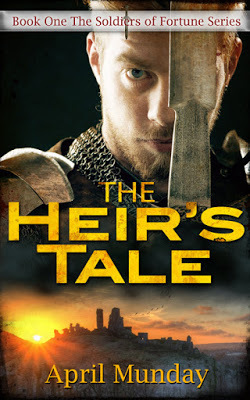 1357 Ancelin Montfort returns from fighting in France eager to see the woman he has always loved. Following his brother's death, he is heir to his father's earldom, and his new responsibilities weigh heavily on the young knight. He hopes that Alice will provide the distraction he needs.
1357 Ancelin Montfort returns from fighting in France eager to see the woman he has always loved. Following his brother's death, he is heir to his father's earldom, and his new responsibilities weigh heavily on the young knight. He hopes that Alice will provide the distraction he needs.Emma expects to marry Ancelin within a few days of his arrival, but he pays more attention to his widowed sister-in-law than he does to her. The more time Emma spends with him, the more she realizes that he's no longer the man she fell in love with. When he accuses her of seeing other men in his absence, Emma fights back.The Heir's Tale is the first in a series of medieval romances. If you like vivid historical detail and fast-paced compelling drama, you'll love April Munday's The Heir's Tale.
Amazon
April Munday
 April Munday is the author of romances set in the fourteenth century. She lives in Hampshire, where many of her stories are set. In her head she lives in the fourteenth century, but only in her head; she has learned far too much about life in the Middle Ages to want to live there in reality. She is inspired by the remnants of the past which are part of her local landscape. Her latest series, The Soldiers of Fortune, is set after the Battle of Poitiers, which changes the lives of four brothers.
April Munday is the author of romances set in the fourteenth century. She lives in Hampshire, where many of her stories are set. In her head she lives in the fourteenth century, but only in her head; she has learned far too much about life in the Middle Ages to want to live there in reality. She is inspired by the remnants of the past which are part of her local landscape. Her latest series, The Soldiers of Fortune, is set after the Battle of Poitiers, which changes the lives of four brothers. April loves to hear from readers, you can find her: Blog • Facebook • Twitter.
Published on October 22, 2018 23:00
October 21, 2018
Book Spotlight — Wings of a Flying Tiger by Iris Yang #NankingMassacre #China #mustread @IrisYang86351
Wings of a Flying Tiger
By Iris Yang

In the summer of 1942, Danny Hardy bails out of his fighter plane into a remote region of western China. With multiple injuries, malaria, and Japanese troops searching for him, the American pilot’s odds of survival are slim.
Jasmine Bai, an art student who had been saved by Americans during the notorious Nanking Massacre, seems an unlikely heroine to rescue the wounded Flying Tiger. Daisy Bai, Jasmine’s younger cousin, also falls in love with the courageous American.
With the help of Daisy’s brother, an entire village opens its arms to heal a Flying Tiger with injured wings, but as a result of their charity the serenity of their community is forever shattered.
Love, sacrifice, kindness, and bravery all play a part in this heroic tale that takes place during one of the darkest hours of Chinese history.
Excerpt
 “Get the hell out of there, Jack. Now!” Danny Hardy barked into the radio.
“Get the hell out of there, Jack. Now!” Danny Hardy barked into the radio. Through the debris that erupted from the enemy plane he’d shot down, he gazed at a flaming aircraft emblazoned with tiger’s teeth. God, please, he silently prayed, hoping to see his wingman pop out of the airplane any second.
Danny hadn’t heard Jack’s voice on the radio since he’d been hit, but that didn’t stop him from calling out again: “Jack, bail out!”
Minutes ago Jack Longman had sent two Japanese aircraft spinning down to earth, but now his plane was on fire. Two Zeros flanked him. He’d been hit from both sides. Fire blazed from the fuselage tank of his P-40 and roared into the cockpit. His airplane remained level for only a moment then plunged, nose down, toward the earth. Rolling back the canopy, Jack leaned left and tumbled out of the plane, which was now wreathed in smoke. When he opened his parachute, part of his body was on fire.
Danny let out a relieved breath when he saw Jack’s tall figure drop out of his airplane. One corner of his lips tilted upward. But before his smile had formed completely, to his horror, a Japanese fighter dropped on Jack, firing a heartless spray of bullets.
“No!” Danny cried. His heart thundered. Waves of panic spread throughout his body. It all had happened too fast. He wasn’t close enough to catch up with the Japanese. Helplessly, he watched as his best friend was strafed to death while strapped in his parachute.
“Jack!” A lump formed in the back of his throat and burned as Danny tried to choke back tears. He couldn’t let the enemy get away. He roared after the Japanese. His P-40 wasn’t as versatile as the enemy airplanes, but it was faster in a dive. Flying Tigers were trained to exploit that advantage. Within seconds, he caught up with one of the two fighters that had killed Jack. He brought his guns in line for a shot from the rear. Before the Japanese pilot realized his fate, Danny poured a salvo directly into his cockpit. Flames erupted from the Zero. A fireball spun earthbound.
This maneuver exposed Danny’s P-40 to the other Japanese fighter, who fired at him from the left. An explosion blasted his left wing, and the plane shook. At the same time, bullets riddled his cockpit. One of them grazed his scalp; others buried themselves in the instrument panel. Blood gushed from his forehead, covering his goggles and blocking his sight. Red spots spattered the white scarf around his neck.
Pulling his stick with his right hand, and lifting his left to wipe the blood off his goggles, he realized that his left arm and leg had been injured by shrapnel. In the midst of the white-knuckled fight, the excruciating pain hadn’t hit him until now.
Switching to his right hand, Danny pulled off his goggles. Once he could see, he checked his left wing. What he saw made his blood run cold. The explosion had left a hole two feet in diameter, halfway between the wingtip and the root. He was astonished the wing was still attached.
The shock didn’t last long. No time to waste. He was trained as a fighter pilot, and fighting was second nature.
Ignoring the throbbing pain, Danny hauled his P-40 into a tight turn. Advancing the throttle, he flew toward the enemy fighter who had shot at him. His engine roared. The force jammed him into his seat. Bullets ricocheted through his plane, flashing like firecrackers. But nothing deterred him. Swooping toward the fighter, he thumbed on the gun switch and opened fire. His tracers strafed the front of the Zero.
The Japanese seemed startled by the American pilot’s comeback. The bravery of the American Volunteer Group, the Flying Tigers, was well known by this time, the summer of 1942, but this Tiger was completely insane. The little airman flinched, yet held his course.
“If you don’t ram into me, I’m going to ram you!” Danny shouted, sweating beneath his sheepskin-lined jacket. He knew he shouldn’t do this—the Japanese pilots were disciplined flyers; they were not cowards. And Danny had no intention of dying. However, this Zero was the one that had shot Jack down. Revenge was the only thing on his mind. He had no plan to turn around.
Might as well take someone with me if my number is up…
Although he had lived only twenty-seven years, that was long enough to destroy twelve enemy airplanes. “Let’s make this one the thirteenth!” he shouted, his hand on the trigger and death in his eyes.
The two planes were so close that Danny could see the stone-faced Japanese pilot glaring at him. For what seemed like an eternity, they stared at each other. Time slowed as their planes closed in. It was a contest of wills.
A split-second before the crash, the wide-eyed Japanese pilot lost his nerve and tried to peel away from a head-on collision, a maneuver which left him vulnerable.
Danny jumped at the chance and blazed with everything he had. His hand never left the trigger. His tracers tore the Zero to pieces.
He watched the enemy plane turn into a fireball. It streamed black and white smoke, went into a rapid spin, and plummeted to Earth.
Danny had no time to celebrate his success. Hits that he’d sustained during the death match made his plane wobble like a drunkard. He had to abandon his P-40. As he prepared to jump, he glanced down at the exotic highlands unfolding below him. Yunnan Province of China was composed of magnificent mountains and sweeping plains. He was over a mountainous region carpeted by lush green trees. Somewhere beneath the shady canopy lay his best friend’s body, burned and riddled with Japanese bullets. Suddenly, Danny changed his mind. By now, fewer and fewer of their aircraft remained intact. God knows we need every single one. Their air-worthy planes were already outnumbered—today four P-40s had had to fight two dozen Zeros. Now, with Jack’s death, two airplanes would be gone if he bailed out.
Danny felt exhausted. He grimaced. The injuries to his head, arm, and leg were nasty, but something else was wrong. Could it be the cold he’d come down with during the past few days? No matter how tired he was, Danny refused to let his plane go down. Not without a fight. Not until he’d tried everything he could. With one last look at his damaged left wing, he took a few deep breaths and forced himself to lean back against his seat. His hand clutched the stick in a death grip, and with what seemed like a superhuman effort, he fought to stabilize the aircraft.
He didn’t think about dying, he was too involved in keeping his P-40 in the air. Setting his course toward Kunming, Yunnan’s capital, he tried to level the plane. But it was so crippled, he could barely maintain control.
He had managed to fly for twenty or thirty minutes, but the mental pain of losing his best friend from childhood, the physical ache of his wounds, as well as that mysterious illness―whatever it was―all crashed in on him, and before long the aircraft would not respond to his commands. The stricken P-40 snapped into a spin, and no matter how hard he tried, he couldn’t recover it.
Now he had no choice. With his last ounce of strength, he slid back the canopy. The wind screeched and plastered the skin over his face. He was barely conscious when he tumbled, head over heels, into space.
Amazon
Iris Yang
 Iris Yang (Qing Yang) was born and raised in China. She has loved reading and writing since she was a child, but in China creative writing was a dangerous career. As famous writers and translators, her grandmother and her aunt were wrongfully accused as counter-revolutionary Rightists, so Iris had to choose a safer path—studying science.
Iris Yang (Qing Yang) was born and raised in China. She has loved reading and writing since she was a child, but in China creative writing was a dangerous career. As famous writers and translators, her grandmother and her aunt were wrongfully accused as counter-revolutionary Rightists, so Iris had to choose a safer path—studying science.After graduating from Wuhan University and passing a series of exams, she was accepted by the prestigious CUSBEA (China-United States Biochemistry Examination and Application program). At age 23, with poor English, little knowledge of the country, and 500 borrowed dollars, she came to the United States as a graduate student at the University of Rochester.
Later, she received a Ph.D. in molecular biology, trained as a postdoctoral fellow at Cold Spring Harbor Laboratory, and worked at the University of North Carolina. Although she has published a number of scientific papers, she has a passion for creative writing, and her short stories have won contests and have been published in anthologies. Currently, Iris is working on a story based on her grandmother, who was the first Chinese woman to receive a master’s degree in Edinburgh in the UK. Iris now lives between Sedona, Arizona and Chapel Hill, North Carolina. Besides writing, she loves hiking, dancing, photography, and travel.
Iris loves to hear from readers, you can find her: Website • Facebook • Twitter
Recent press interviews with Iris Yang.

Xinhaunet • China Daily • AsAmNews • Global Times • ShenZhen Daily • The China Press (侨报) • The Straits Times • China Daily • Wuhan Capital •里仁社区酷播 (Clobar/Kuba)
p.p1 {margin: 0.0px 0.0px 0.0px 0.0px; font: 16.0px 'Times New Roman'; color: #4787ff; -webkit-text-stroke: #000000} p.p2 {margin: 0.0px 0.0px 0.0px 0.0px; font: 16.0px 'Times New Roman'; color: #4787ff; -webkit-text-stroke: #4787ff} span.s1 {font-kerning: none; color: #000000} span.s2 {text-decoration: underline ; font-kerning: none} span.s3 {text-decoration: underline ; font-kerning: none; -webkit-text-stroke: 0px #000000} span.s4 {font-kerning: none; color: #000000; -webkit-text-stroke: 0px #000000} span.s5 {text-decoration: underline ; font-kerning: none; -webkit-text-stroke: 0px #4787ff} span.s6 {font: 16.0px 'MS Gothic'; font-kerning: none; color: #000000; -webkit-text-stroke: 0px #000000}
Published on October 21, 2018 23:00
October 19, 2018
#BookReview — The Beaufort Bride: The Life of Margaret Beaufort (Beaufort Chronicles #1) By Judith Arnopp #HistoricalFiction #Tudors @JudithArnopp
“When I was a child, I talked like a child, I thought like a child, I reasoned like a child. When I became a man, I put the ways of childhood behind me…”1 Corinthians 13:11
The bells ring out in celebration, but Lady Margaret can only think of all the things that she is losing. At twelve years old she is no longer a child, but a wife to King Henry’s half-brother — Edmund, Earl of Richmond. Marriage to Edmund has secured Margaret’s future, but Margaret cannot help but fear that their marriage will not be a happy one, for he is formidable and so much older than she is.
Forced to put her childish ways behind her, Margaret is determined to make the most of her position as the Countess of Richmond. However, her husband is eager for an heir. Margaret, despite her young years, has no choice but to obey Edmund in everything. In a strange foreign land, far away from her family, Margaret turns to God for reassurance and comfort.
From the comforting nursery at Bletsoe Castle to the cold and formidable fortress of Jasper Tudor’s stronghold in Pembrokeshire, The Beaufort Bride: The Life of Margaret Beaufort (Beaufort Chronicles #1) by Judith Arnopp is a beautifully presented and wonderfully compelling story of Lady Margaret Beaufort’s early years.
Margaret is portrayed as a conscientious student who has a vivid, if somewhat frightening, imagination. She also has all the makings of a powerful and determined young woman. The stage is set for the story of one woman’s resolve to see her son crowned King.
To write in the first person from the perspective of a young child is notoriously difficult to do well. However, Ms Arnopp has cleverly crafted a character whose innocence and lack of understanding as to why she has to marry when she is still in the nursery, shines from the pages as elegantly as the illumination in the Book of Hours.
Margaret is often painted as a rather cold and God-fearing woman, whose cunning and manipulation made way for her son to take the throne. Yet, in Mrs Arnopp’s portrayal, Margaret is very much an innocent who inspires a great deal of sympathy, but also admiration. My heart went out to her on many occasions, and although there are hints of the God-fearing woman, Margaret was later to become, there was also a tender and vulnerable side to her. Nevertheless, even as a young child, Margaret knows who she is. She is a Lancastrian, and will always be loyal to her House.
Ms Arnopp has kept close to the documented history of the time. If you already know Margaret’s story, then you will find no glaring inaccuracies in this book. What Ms Arnopp has done is breathe fresh life into the world that Margaret lived and the people who shared it with her. The Beaufort Bride: The Life of Margaret Beaufort is a story I would willingly get lost in time and again.
I Highly Recommend.
Review by Mary Anne YardeThe Coffee Pot Book Club
Amazon UK • Amazon US
Judith Arnopp
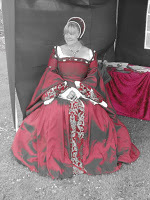 Judith Arnopp is the author of ten historical novels including The Winchester Goose, The Beaufort Chronicle (three book series), The Kiss of the Concubine and A Song of Sixpence. You can find her on Facebook • Twitter • Website • Blog.
Judith Arnopp is the author of ten historical novels including The Winchester Goose, The Beaufort Chronicle (three book series), The Kiss of the Concubine and A Song of Sixpence. You can find her on Facebook • Twitter • Website • Blog.
Published on October 19, 2018 23:00
October 18, 2018
A conversation with Historical Romance author, Jackie Williams. #Regency #Romance #MustRead @wackyjackyful
A conversation with Historical Romance author, Jackie Williams.

Hi Jackie, it is great to see you back on the blog! Could you tell us a little bit about yourself?
Hello, I’m Jackie Williams, a 50 something year old lady on a mission having been gripped by the writing bug for the last seven years. After having written one book for my daughter (fourteen at the time) as a challenge by my doubting husband - something you should never do to me for fear of unleashing a monster! - I found that I simply could not stop. Ideas have poured out of me continuously since and I am now on book thirty-one, with even more on the way.After stringing pearls and making pearl jewellery for thirty years, I felt I needed a change and it came in the form of writing, something I have always loved to do, but never gave myself the time to indulge fully. After dabbling with some contemporary and young adult themes, I leapt into my favourite genre as a reader, historical romantic mystery. An avid reader by my early teens and already completely in love with Mr. Darcy, (Pride and Prejudice – Jane Austen) I adored the thought of all the ladies in beautiful dresses, the heroes in buff breeches, the balls, the banquets... Almost thirty-five years later, it was my turn to write them.
I think we are all in love with Mr Darcy! What inspired you to write A Bed of Wild Roses – Flowers of the Aristocracy (Untamed Regency Series)?
Historical mystery and romance go hand in hand. For me you cannot have one without the other. I had already written one series (Unrivalled Regency) and I had included a humerous scene or two within each book however serious the subject matter, but I found I enjoyed writing the comedic side more than I expected. Especially as in real life, men can be such wonderful subjects for hilarity, even when they don’t know that they are being hilarious. I wanted to take this style of writing further and bring in the light-heartedness throughout the tale, mixing it with the romance and the mystery while not losing the cheeriness of tone. From the wonderful reviews received, it would appear that I have succeeded!
I love A Bed of Wild Roses, you can see my review here!What were the challenges you faced in researching this period of history?There are so many challenges when writing Regency. The era was the cusp of seemingly so much invention, but apart from the things that we now take for granted, like matches and running water in the home, even putting on or taking off clothes was a challenge. (Am I glad that we now don’t wear corsets!) But I found that ‘time’ was my biggest challenge. There is so much time involved in simply getting a message from one place to another that it boggled my mind. There was no postal service, no easy way to travel quickly. You simply cannot leave London at four in the afternoon and arrive in Bath in two hours later when riding in a horse-drawn carriage on inadequate roads. The timing of events, how people responded to invitations, the inconsistencies and difficulties when travelling needed careful consideration and much counting of hours on fingers to make sure that a character didn’t arrive at an event before they could have possibly known about it.
Yes, we take travel so much for granted nowadays. A journey from London to Bath would have been very long. There are many books that are set in Regency England. Can you tell us three things that sets your novel apart?The light humour and breeziness of my book, while still a serious mystery is a marked difference to the norm.I am not afraid of bringing in difficult subjects to my stories. A Bed of Wild Roses has several uncomfortable/serious situations within the first couple of chapters, which affect the whole lives and later decisions of the individual characters in the series. These events are important and are not to be shied away from. Things like this happened. Though difficult, they are vital in building an individual’s personality, integrity, and appeal. I also think that my male characters (my heroes) are unusual in that they are not arrogant beasts in need of changing by their female counterpart. They are gentlemen in every sense. Yes they have challenges, they might seem a little pompous, but beneath all their bluster they are good through and through!That is why I love your books so much. The Heroes are very likable and the heroines are wonderfully portrayed. Can you tell us what you are currently working on?I am currently working on two projects. The fourth book in the Flowers of the Aristocracy - Untamed Regency series, A Fragile Chain of Daisies. Accused of murdering the Duke of Portland, Lord Pierce Trenchard is on the run, and only Lady Daisy, Duchess of Portland and wife of the murdered Duke, can save him. But will she? And a new venture in historical fiction, an early Victorian murder mystery. Will the Fourth Earl of Claiborne discover who murdered his predecessor, or will he become another victim? - There will of course be a little romance included!
Untamed Regency is such a great series, I can’t wait to read book four! What other interests do you have when not writing?I still enjoy making pearl jewellery. Though time consuming and hard on the eyes, it is a lovely thing to do. I don’t think I will ever give it up completely. Pearls are the only gem used that are not polished or altered in any way. Their natural beauty fascinates me. I have also taken up photography. It is a fabulous way to get out and about. I enjoy going to many historical houses where I take pictures to use on my book covers. All the backgrounds of the covers in the Flowers of the Aristocracy series are from pictures taken by me on a special day out at Chatsworth.
A Bed of Wild Roses
 A Bed of Wild Roses. Flowers of the Aristocracy. (Untamed Regency Series) A Regency Mystery Romance.An innocent kiss might not have sealed her fate. Even a scandalously slippery jelly could be explained away. But revealing one’s long hidden charms to the local nobility can only lead Lady Felicity into marriage or ruination.How could a childhood game become so complicated? How could a dessert behave so decadently? And how could his own shrubbery become so untamed? Caught between debt, honour, and Felicity’s more than irate brother, Lord Algernon Barclay’s immediate future can only lead in one direction. Straight into a parson’s noose. But even while reconciling themselves to their fate, a killer stalks. Amid attempted murder, thieving relatives, and renovating an impoverished estate, will they surrender to their shared attraction, or will Algernon’s stubborn heart convince her to give up and leave him. This light-hearted Regency mystery romance is suitable for ages 16 and above due to sensual love scenes.
A Bed of Wild Roses. Flowers of the Aristocracy. (Untamed Regency Series) A Regency Mystery Romance.An innocent kiss might not have sealed her fate. Even a scandalously slippery jelly could be explained away. But revealing one’s long hidden charms to the local nobility can only lead Lady Felicity into marriage or ruination.How could a childhood game become so complicated? How could a dessert behave so decadently? And how could his own shrubbery become so untamed? Caught between debt, honour, and Felicity’s more than irate brother, Lord Algernon Barclay’s immediate future can only lead in one direction. Straight into a parson’s noose. But even while reconciling themselves to their fate, a killer stalks. Amid attempted murder, thieving relatives, and renovating an impoverished estate, will they surrender to their shared attraction, or will Algernon’s stubborn heart convince her to give up and leave him. This light-hearted Regency mystery romance is suitable for ages 16 and above due to sensual love scenes.Excerpt
Lord Algernon Barclay stood by his sister, eyeing her pale blue silk gown with something bordering on horror. He glowered at any man over the age of fourteen who dared turn his eyes upon her. That meant every man in the room came under his savage scrutiny.
“How on earth did mother let you out of the house dressed like that? It’s virtually transparent, and your, your...” He hissed as he took a deep breath and waved his hand about in the general direction of her breasts. Her breasts? Good God! My sister has breasts! He thought as he rolled his eyes heavenward, hoping that this was all a bad dream.
It wasn’t. An elderly gentleman bowed and smiled appreciatively, his eyes never rising as far as her face. He glanced up at Algernon after some seconds blatant perusal.
“Ah, Barclay. My condolences on your father’s passing. A good man. And who might this young incomparable be.” The old goat had the temerity to wink as he bowed over Sophia’s hand.
Algernon’s chest swelled with fury as he drew in a long breath. Although his father had been gone less than half a year, he had decided that Sophia should be allowed to come to their farewell dinner. Black wouldn’t have been the kindest choice for someone so young to wear at her first public function, but right at that moment he wished he had insisted on custom. He quelled his temper for his sister’s sake and made the expected introduction.
“My sister, Lady Sophia. She’s only out for this evening.” He bowed and steered Sophia in a new direction even as he growled under his breath. “Dear Lord! Every man in the room, including old Bucklersby has been ogling you these last ten minutes. If I come out of this without having to put a round through someone’s shoulder, I’ll be mightily surprised!” He took a third glass of champagne and threw it down his throat.
Sophia Barclay dimpled up at her brother.
“Don’t be such a ninny. I’m sixteen, hardly a child any longer, and this style of dress is all the rage. It’s beautiful. Thank you for agreeing to me wearing it.” She brushed her fingers down the yards of delicate fabric. Her gown was gaining the exact reaction that she hoped, though she would rather it had been Brendon Spencer ogling her rather than Lord Bucklersby.
Algernon snorted loudly.
“I don’t know what I was thinking! You are not yet out. I swear I’m going to punch someone. Look at Bertie Devereaux, and Lucas Caruthers! They’re both positively salivating! I’ll have to kill them!” He pushed his empty glass back at a passing servant and took a long stride forwards, but was immediately pulled back by his sister’s quick hand.
She held onto his elbow.
“You’ll do no such thing. You are being a horrible grumpy goose. This is supposed to be a fare-thee-well party. Our two families celebrating yours and Brendon’s success. Don’t be a horror to your other friends. They will be all I have while you are away.”
Algernon huffed.
“Friends are all they had better be. I’m going to speak to them later. They might be a year younger than Brendon and I, but I know what those young gentlemen are like. If they so much as look at you in the wrong way whilst I am gone, I’ll call them out as soon as I come back!”
Sophia smiled up at him, loving his concern. She hadn’t seen a lot of him for the last eight years and it hurt her that he was going away again so soon after their father’s passing. That he cared so much about his friends attentions made her feel slightly better about the situation.
“There will be no need for pistols at dawn.” She soothed him. “Your friends will have far more exciting things on their minds than attempting to court me.” She changed the subject quickly as Algernon’s frame puffed up even more at her words. “Felicity and Bren will be down soon. We can make up a foursome just like when we were little.”
If Algernon had still been drinking he would have spat out his wine.
“You jest, surely! I need to keep out of his sister’s way as much as possible tonight. Took me almost a year before Bren would even look at me again after that little debacle in the housekeeper’s office. And another six months before he would listen to my perfectly honest explanation. My eye has never been the same since either.” He stopped as his sister let out a ringing laugh.
“Oh Algernon! You do make me laugh. We were only eight. I suspect she barely recalls the incident. I wouldn’t even remember it if you didn’t go on about it every time I even mention her name.” She wafted her fan to cool her cheeks and the scent of flowers reached him.
Algernon sucked in a breath as he recalled the fateful day. Felicity Spencer had smelled of flowers. The scent had been in her hair. Not gardenias, like his sister preferred, but roses if he remembered rightly. Not that he wanted to remember, but it had been an unforgettable day.
He slid his hand into his pocket and rubbed the guinea he’d refused to ever spend. The thought of deriving any pleasure from the bribe sickened him. What with discovering his father’s infidelities, the horrible subsequent conversation, and then the fateful game of hide and seek, it might have been the most miserable day of his life.
But that time was past. He had grown up and his father was gone. He really should get over it, but something still rankled and he knew exactly what. Felicity. He had seen little of her over the subsequent years but he hadn’t needed to. Every time he smelled even the merest hint of roses, he recalled that day.
He leaned down and hissed his words.
“The trouble she caused, can you even wonder why I can’t forget it. If I never see that little viper again it will be too...” His voice faded and his jaw fell open as he noticed his best friend following the host and hostess into the salon. Walking beside Brendon, no, not walking but gliding elegantly, was the most ravishing creature he had ever laid his eyes upon.
Well! The sly old dog! Where on earth had Brendon conjured her up from? They had only returned from Italy six months previously and what with the scandal surrounding Lord Barclay’s death, he and Brendon had barely gone out, preferring to remain at home or at their club with friends almost every evening since. It hardly seemed possible that the man could have discovered anyone so utterly gorgeous without his best friend knowing.
He watched Brendon walk into the room with his companion held tightly at his side. The man scowled around the salon as Bertie, Lucas, Pierce and several other gentlemen bowed in front of them. Algernon stared at the beauty. Her dark golden ringlets curled over one bare shoulder, her cornflower blue eyes sparkled in the candle light, her silk dress shimmered, catching the breeze coming in at the window, and for one infinitesimal moment, the material outlined the curves of her slender but lush body. He gulped at the image that had all his blood heading for his groin and he thanked the Lord that he had kept his jacket buttoned.
His sister’s voice sounded at his side and she gave a tug at his elbow.
“Would you like a handkerchief?”
He glanced down uncomprehendingly.
“Pardon? Whatever are you talking about?”
Sophia pressed her lips together and lifted her hand to pluck a square of silk from his coat pocket. She held it up for him.
“For the drool.” She smiled brightly as she waved the cloth under his nose.Algernon rolled his eyes, grabbed the fabric, and shoved it back in his pocket while he looked back towards his friend.
“Bloody dark horse! He never told me he was bringing a partner. Damn, but she’s lovely. I wonder where he found her?” He looked down curiously at his sister’s trilling laugh. “What now?” But Sophia had stepped forward, obviously intent on greeting Brendon and his delectable partner.
The two young women clasped hands and kissed each other with exclamations of delight and compliments on each other’s dress.
Brendon frowned down at the pair of them before glancing back up at Algernon and whispering an aside.
“It seems that your escort knows Felicity. If I find she’s the one who has been teaching her about men and their wild oats, I’ll have your hide,” he hissed menacingly.
Algernon felt the earth fall away from beneath his feet.
“Felicity? Your sister, Felicity?” His voice was a strangled cry. What had happened to the brat who followed them about and played hide and seek?
Brendon’s frown deepened.
“Well, of course! Who the bloody hell did you think she was? Some lightskirt like you brought along to dinner? Where in god’s name have you been hiding her? I’m surprised Johnston let you through the door,” he hissed back.
Algernon immediately snapped his head back and drew himself up to his full six feet four inches.
“Lightskirt? How bloody dare you! I should call you out! That’s Sophia, my sister, you idiot! Damnable girl has grown far more than I thought in the last couple of years, and what with mother’s liking for the latest fashion...Well, I’ve been holding off half your randy guests for the last twenty minutes!” He ran his finger around inside his suddenly over tight cravat.
Brendon cast his eyes back over the two women who had now taken glasses of champagne from a tray. Good God! Could they possibly be the same two girls with whom they had once played hide and seek? He let out a deep breath and glowered about at the rest of the guests. Many eyes were still on both Felicity and Sophia. The males with appreciation and lust burning in their eyes, while the women sent barbs sharp enough to skewer armour. Not that he was one bit surprised. The two young women, one dark as night and the other as fair as a summer day, outshone everyone else in the room.
The Kindle copy of A Bed of Wild Roses is only 99p/99c for a LIMITED TIME!Amazon
Jackie Williams
 I was born in Essex England during the mid sixties but I missed all the fun. Being only young, I assumed that all Beatles were six legged creatures and Flower Power was something to do with the vigorous way my mother kneaded the bread dough.
I was born in Essex England during the mid sixties but I missed all the fun. Being only young, I assumed that all Beatles were six legged creatures and Flower Power was something to do with the vigorous way my mother kneaded the bread dough.My wonderful parents brought me up with a huge love of books. We read anything and everything. Bedtime stories were a treasured time of adventure and mystery. My sister and I sat wide eyed in wonder and to this day I worry about Dinah and Dorinda being pricked with pins because they grew so fat, and I never pull faces at the a waning moon (or was it a waxing one?) just in case my chops stay that way . (The Wind On The Moon)
I began reading romance while still at school. The fuel for many a teenage fantasy leapt from between the covers of wildly romantic books and my passion still lingers now for all those dark haired heroes.
After being challenged by my husband, my own beautiful teenage daughter persuaded me to write my first romance. She was only fourteen at the time and between books for children and adults. She couldn't find anything that ticked all her numerous and particular boxes and so she asked me to write a book, with all the exact ingredients just for her. Though not just a book for teens, she enjoyed the resulting tale so much that she shared it with her friends and I eventually published A Perfect Summer as an ebook on amazon.
But I have discovered that writing is not easily stopped once you start. It has turned into a grand passion that I just cannot hold back. The fingertips start tapping the keys and ideas suddenly come flooding, far too many for just one book and so I began another and then another, 30 books later I am still nowhere near done.
I hope you enjoy all of my efforts and I look forward to your comments and reviews.
If you are interested in finding out more, you can see what I get up to at: Romantic Suspense Books.Don’t forget to sign up to my newsletter.You can find me on: Wordpress • Twitter • Facebook • Google+ • Pinterest• Instagram.And you can always Email me at:Jackie@romanticsuspensebooks.co.uk

<!-- /* Font Definitions */ @font-face {font-family:"Cambria Math"; panose-1:2 4 5 3 5 4 6 3 2 4; mso-font-charset:0; mso-generic-font-family:auto; mso-font-pitch:variable; mso-font-signature:3 0 0 0 1 0;} @font-face {font-family:Calibri; panose-1:2 15 5 2 2 2 4 3 2 4; mso-font-charset:0; mso-generic-font-family:auto; mso-font-pitch:variable; mso-font-signature:-520092929 1073786111 9 0 415 0;} /* Style Definitions */ p.MsoNormal, li.MsoNormal, div.MsoNormal {mso-style-unhide:no; mso-style-qformat:yes; mso-style-parent:""; margin-top:0cm; margin-right:0cm; margin-bottom:10.0pt; margin-left:0cm; line-height:115%; mso-pagination:widow-orphan; font-size:11.0pt; font-family:Calibri; mso-ascii-font-family:Calibri; mso-ascii-theme-font:minor-latin; mso-fareast-font-family:Calibri; mso-fareast-theme-font:minor-latin; mso-hansi-font-family:Calibri; mso-hansi-theme-font:minor-latin; mso-bidi-font-family:"Times New Roman"; mso-bidi-theme-font:minor-bidi;} a:link, span.MsoHyperlink {mso-style-priority:99; color:blue; mso-themecolor:hyperlink; text-decoration:underline; text-underline:single;} a:visited, span.MsoHyperlinkFollowed {mso-style-noshow:yes; mso-style-priority:99; color:purple; mso-themecolor:followedhyperlink; text-decoration:underline; text-underline:single;} .MsoChpDefault {mso-style-type:export-only; mso-default-props:yes; font-size:11.0pt; mso-ansi-font-size:11.0pt; mso-bidi-font-size:11.0pt; font-family:Calibri; mso-ascii-font-family:Calibri; mso-ascii-theme-font:minor-latin; mso-fareast-font-family:Calibri; mso-fareast-theme-font:minor-latin; mso-hansi-font-family:Calibri; mso-hansi-theme-font:minor-latin; mso-bidi-font-family:"Times New Roman"; mso-bidi-theme-font:minor-bidi;} .MsoPapDefault {mso-style-type:export-only; margin-bottom:10.0pt; line-height:115%;} @page WordSection1 {size:612.0pt 792.0pt; margin:72.0pt 90.0pt 72.0pt 90.0pt; mso-header-margin:36.0pt; mso-footer-margin:36.0pt; mso-paper-source:0;} div.WordSection1 {page:WordSection1;} </style> -->
Published on October 18, 2018 23:00
October 17, 2018
Book Spotlight — The Wars Of Edward I The Leopard 1255 - 74 by David Pilling #Medieval #History @RobeH2
The Wars Of Edward I
The Leopard 1255 – 74
By David Pilling
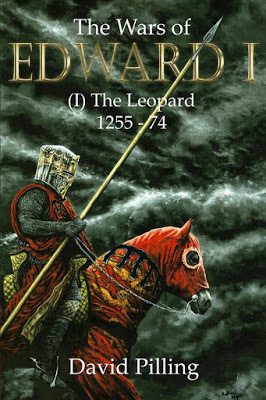
‘To whom shall the noble Edward be compared? Perhaps he will be rightly called a leopard…’
Thus the Song of Lewes, composed by a hostile poet, described Edward I of England, remembered as the conqueror of Wales and Hammer of the Scots. By comparing him to a leopard, the poet praised Edward’s pride and fierceness, but criticised his alleged treachery and falsehood.
From his youth Edward divided opinion, and still does to this day.
Few princes had to serve such a tough or prolonged military apprenticeship. Edward’s early difficulties and failures, especially in Wales, forged him into one of the ablest Plantagenet warrior-kings. His alleged inconstancy as a youth saddled him with the reputation of an oath-breaker, and his capture at the Battle of Lewes was a signal humiliation. The spectacular reversal of fortune at Evesham, and swift rise thereafter to commander-in-chief of his father’s armies, proved the making of Edward’s reputation.
Edward owed much of his contemporary fame to his prowess as a general and fighting soldier. This book is the first of a three-part study of his military career, beginning with Edward’s first experience of war as a teenager in the duchy of Gascony, ending in his last doomed march to Scotland, aged sixty-seven. Book One deals with his formative military experiences in Gascony and Wales, the Second Barons’ War and the suppression of the Disinherited, and finally his role in the ill-fated Ninth Crusade.
This is the first non-fiction book by David Pilling, author of the Leader of Battles series, Soldier of Fortune, Caesar’s Sword, Reiver, and many other tales.
Excerpt
'Helpless in prison, Edward could do nothing to influence events. His old foe, Robert Ferrers, now took revenge for the devastation Edward had wreaked on his estates in the spring. Shortly after Easter 1264 he and other barons attacked Edwardian castles in the Midlands, seized Tickhill and Bolsover and destroyed Alvestone and Harestan. Ferrers also found time to help Baldwin Wake in the attack on Fotherinhay Castle, and in late June or early June captured Edward’s chief castle of the Peak in Derbyshire. At about the same time he took Nottingham Castle and installed his own men in the garrison, including one Roger Godberd, who would later earn notoriety in his own right. Later, in November, Ferrers led a large army to Chester and routed a royalist force led by Dafydd ap Gruffudd and two Marcher barons:
‘Robert de Ferrers of Derby took twenty thousand foot, and an equal number of horse, and marched on Chester. And there he encountered William le Zouche, David the brother of Llewelyn, James de Audley, and a multitude of others, but they did not dare to come against the earl in battle, and so fled. And when it came to the pursuit, he killed up to a hundred of them, and captured others; and only one of his men was wounded.'
Amazon US • Amazon UK
David Pilling
 I’m an English writer and researcher, addicted to history for as long as I can remember. I spent much of my childhood dragging my parents up and down ruined castles in Wales, and the medieval period has always held a particular fascination for me. I am also interested in the Roman period, the Dark Ages and the British Civil Wars of the 17th century.
I’m an English writer and researcher, addicted to history for as long as I can remember. I spent much of my childhood dragging my parents up and down ruined castles in Wales, and the medieval period has always held a particular fascination for me. I am also interested in the Roman period, the Dark Ages and the British Civil Wars of the 17th century. David loves to hear from readers, you can find him: Blog • Facebook •Twitter.
Published on October 17, 2018 23:00
October 16, 2018
The Coming of the Saxons... by Mary Anne Yarde #History #Saxons #Jutes
The Coming of the Saxons... By Mary Anne Yarde
 Britain 400–500: Anglo-Saxon Homelands and Settlements — Wikipedia
Britain 400–500: Anglo-Saxon Homelands and Settlements — WikipediaIn the year AD 425 Vortigern became the High King of Southern Britain — or so said the 6th Century British monk, Gildas. Vortigern’s reign of 30 years was not, however, without conflict. There was the constant threat of invasion from the Irish on the western seaboard. The Picts were invading from the north, and in the eastern seaboard, the Saxons were trying to push into Vortigern’s realm. It was a war on all fronts. It was a war he could not possibly win.
Vortigern turned to his Roman friends for help. But instead of military assistance, Flavius Aetius, a Roman general, sent Bishop Germanus of Auxerre and Bishop Severus of Trier, to Vortigern’s kingdom to find out what was going on and report back to him. However, Germanus was more concerned about finding the Pelagian heretics than the threat that Vortigern spoke of. Germanus and Severus took their leave, having done very little. Vortigern realised he would not receive any military aid from Rome. If he wanted to save his kingdom, then he was going to have to think of something else.
 Bishop Germanus of Auxerre
Bishop Germanus of AuxerreVortigern did not have many choices open to him. If the Roman Empire would not come to his aid, then he would have to find someone who would. He looked to the land of the Jutes. Vortigern was not the first, and he was certainly not the last to employ mercenaries to fight for his cause. He heard talk of two warrior brothers, Hengist and Horsa. These brothers had a fine army. It was these men that Vortigern struck a deal with. It is worth noting that although Hengist and Horsa were Jutes, they shared the same Germanic language (taking into account the different regional dialects), the same religious philosophies, and the same culture as the Saxons who were causing such a problem for Vortigern in the east.
 Hengist and Horsa arriving in Britain, by Richard Rowlands (1605).
Hengist and Horsa arriving in Britain, by Richard Rowlands (1605).In return for their services, Vortigern gave the brothers land in the Isle of Thanet, Kent. The mercenaries brought over their families, and for a while, things seemed to work well for all. The brothers and their men kept in check their Germanic kinfolk along the east coast. They were also a good match for the Picts in the north. They also help to curb the Irish ambitions as well.
Thanks to Hengist and Horsa, the threat to Vortigern’s kingdom, although still present, was, for now, kept in check. It was then that Hengist and Horsa decided that they were not being paid enough. They were risking their lives for Vortigern. They deserved more. Much more. So they took their demands to Vortigern, along with a promise… If Vortigern did not meet their demands, then they would take his kingdom as payment. It was only fair.
Vortigern found himself in a very difficult position. He had invited these mercenaries into his kingdom. In fact, he had kept on inviting them. And now, there were an awful lot of them. Too many. The Anglo-Saxon Chronicles states that:
“…the Saxons multiplied their numbers, and the British could not feed them.”
Vortigern raised taxes, in a bid to pay his mercenary army. But he could not raise sufficient funds. His people simply did not have the money, and they resented having to pay tax when these foreign settlers, Vortigern had invited over, did not have to pay at all. By the year AD 430 Vortigern faced the threat of civil war. This unrest was led by a man, who the Welsh called, Emrys, and who others called Ambrosius Aurelianus. Vortigern did not know what to do. So he did what he always did. He recruited even more mercenaries. This decision would cost him his throne.
In the year AD 450, Hengist knew that the time was right for usurpation. However, although his mercenary army was great in number, it was not enough. So he called to arms the Angles and the Saxons that had settled in Britain. Then and only then, did he attack.
“Once lit, it did not die down. When it had wasted town and country in that area, it burnt up almost the whole surface of the island, until its red and savage tongue licked the western seas..” On the Ruin and Conquest of Britain — Gildas

The Celts, although their loyalty to their High King had been stretched to the limit, rose up against these foreign aggressors. Vortigern was mortally wounded while leading a campaign to drive the Jutes back to the Isle of Thanet. With Vortigern’s death, the native Celts look to Ambrosius. In the year AD 473, Hengist and his son, Aesc, fought the Celts in Kent and were victorious. In AD 488, Aesc became King of Kent. As for Ambrosius… Nothing more is said of him.
Kent became a secure beachhead for Germanic invasions and eventually the conquest of Britain.
Biblography:(Author Unknown) — The Anglo-Saxon Chronicles (J. M. Dent, New edition, 1972)Bede — Ecclesiastical History of the English People (Bloomsbury Publishing Plc, 2012)Berresford Elllis, Peter — Celt and Saxon (The struggle for Britain AD 410-937) (Constable and Company Ltd , 1994)Geoffrey of Monmouth — The History of the Kings of Britain (Penguin Books Ltd, 1966)Gildas — On the Ruin and Conquest of Britain (Serenity Publishers, LLC, 2009)Nennius — The History of the Britons (Dodo Press, July 2007)Pryor, Francis — Britain AD: A Quest for Arthur, England and the Anglo-Saxons (HarperCollins Publisher, 2005)Wood, Michael — In Search of the Dark Ages (BBC Books, 2005)Wood, Michael — In Search of England (Penguin Books, 1999)
The Du Lac Prophecy
(Book 4 of The Du Lac Chronicles)
Two Prophesies. Two Noble Households. One Throne.
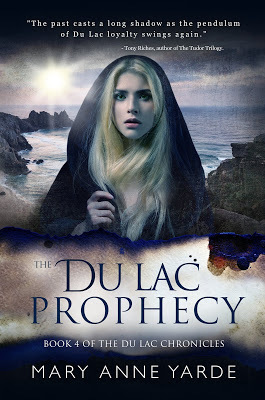 Distrust and greed threaten to destroy the House of du Lac. Mordred Pendragon strengthens his hold on Brittany and the surrounding kingdoms while Alan, Mordred’s cousin, embarks on a desperate quest to find Arthur’s lost knights. Without the knights and the relics they hold in trust, they cannot defeat Arthur’s only son – but finding the knights is only half of the battle. Convincing them to fight on the side of the Du Lac’s, their sworn enemy, will not be easy.
Distrust and greed threaten to destroy the House of du Lac. Mordred Pendragon strengthens his hold on Brittany and the surrounding kingdoms while Alan, Mordred’s cousin, embarks on a desperate quest to find Arthur’s lost knights. Without the knights and the relics they hold in trust, they cannot defeat Arthur’s only son – but finding the knights is only half of the battle. Convincing them to fight on the side of the Du Lac’s, their sworn enemy, will not be easy.-->
If Alden, King of Cerniw, cannot bring unity there will be no need for Arthur’s knights. With Budic threatening to invade Alden’s Kingdom, Merton putting love before duty, and Garren disappearing to goodness knows where, what hope does Alden have? If Alden cannot get his House in order, Mordred will destroy them all.
Amazon US • Amazon UK • Amazon CA

Mary Anne Yarde
 Mary Anne Yarde is the multi award-winning author of the International Bestselling series — The Du Lac Chronicles.
Mary Anne Yarde is the multi award-winning author of the International Bestselling series — The Du Lac Chronicles.Yarde grew up in the southwest of England, surrounded and influenced by centuries of history and mythology. Glastonbury — the fabled Isle of Avalon — was a mere fifteen-minute drive from her home, and tales of King Arthur and his knights were a part of her childhood.
Mary Anne loves to hear from readers, you can find her:
Media Links: Website/Blog • Facebook • Twitter • Amazon Author Page • Goodreads
Published on October 16, 2018 23:00
October 15, 2018
Blog Tour and #Giveaway Lady of a Thousand Treasures by Sandra Byrd #HistFic #Christian #Victorian @hfvbt @sandrabyrd
Historical Fiction Virtual Book Tour Presents….

Lady of a Thousand TreasuresBy Sandra Byrd

Miss Eleanor Sheffield is a talented evaluator of antiquities, trained to know the difference between a genuine artifact and a fraud. But with her father’s passing and her uncle’s decline into dementia, the family business is at risk. In the Victorian era, unmarried Eleanor cannot run Sheffield Brothers alone.
The death of a longtime client, Baron Lydney, offers an unexpected complication when Eleanor is appointed the temporary trustee of the baron’s legendary collection. She must choose whether to donate the priceless treasures to a museum or allow them to pass to the baron’s only living son, Harry—the man who broke Eleanor’s heart.
Eleanor distrusts the baron’s motives and her own ability to be unbiased regarding Harry’s future. Harry claims to still love her and Eleanor yearns to believe him, but his mysterious comments and actions fuel her doubts. When she learns an Italian beauty accompanied him on his return to England, her lingering hope for a future with Harry dims.
With the threat of debtor’s prison closing in, Eleanor knows that donating the baron’s collection would win her favor among potential clients, saving Sheffield Brothers. But the more time she spends with Harry, the more her faith in him grows. Might Harry be worthy of his inheritance, and her heart, after all? As pressures mount and time runs out, Eleanor must decide whom she can trust—who in her life is false or true, brass or gold—and what is meant to be treasured.
“Sandra Byrd’s amazing cast of characters and Victorian settings pull the reader right into the story. I became happily lost in this compelling, lovely book.” Karen Harper, NYT bestselling author of The Royal Nanny.
“Lady of a Thousand Treasures delivers mystery, romance, and suspense in a well-researched Victorian setting.” Julie Klassen, bestselling author.
Giveaway
During the Blog Tour we will be giving away 5 copies of Lady of a Thousand Treasures by Sandra Byrd!
You can enter:
HERE!
Giveaway Rules
•Giveaway ends at 11:59pm EST on November 9th. You must be 18 or older to enter. •Giveaway is open to US & Canada residents only.•Only one entry per household.•All giveaway entrants agree to be honest and not cheat the systems; any suspect of fraud is decided upon by blog/site owner and the sponsor, and entrants may be disqualified at our discretion.•Winner has 48 hours to claim prize or new winner is chosen.
p.p1 {margin: 0.0px 0.0px 0.0px 0.0px; text-align: center; font: 19.0px Georgia; color: #0c4a49; -webkit-text-stroke: #0c4a49} span.s1 {text-decoration: underline ; font-kerning: none} span.s2 {font-kerning: none; color: #3c2314; -webkit-text-stroke: 0px #3c2314} span.s3 {text-decoration: underline ; font-kerning: none; color: #0c4a49; -webkit-text-stroke: 0px #0c4a49} AMAZON • BARNES AND NOBLE • INDIEBOUND
Sandra Byrd
 Bestselling author Sandra Byrd has published more than fifty books over her editing and writing career. Her traditionally published books include titles by Tyndale House Publishers, Howard Books, a division of Simon and Schuster, WaterBrook Press, a Penguin Random House imprint, and Bethany House. She’s also an independent author.
Bestselling author Sandra Byrd has published more than fifty books over her editing and writing career. Her traditionally published books include titles by Tyndale House Publishers, Howard Books, a division of Simon and Schuster, WaterBrook Press, a Penguin Random House imprint, and Bethany House. She’s also an independent author.Sandra’s series of historically sound Gothic romances launched with the best-selling Mist of Midnight, which earned a coveted Editor’s Choice award from the Historical Novel Society. The second book, Bride of a Distant Isle, has been selected by Romantic Times as a Top Pick. The third in the series, A Lady in Disguise, published in 2017 and was named by the American Library Association’s Booklist as one of the Top Ten Inspirational Fiction books of the year.
Her contemporary adult fiction debut, Let Them Eat Cake, which was a Christy Award finalist, as was her first historical novel, To Die For: A Novel of Anne Boleyn. To Die For was also named a Library Journal Best Books Pick for 2011, and The Secret Keeper: A Novel of Kateryn Parr was named a Library Journal Best Books Pick for 2012.
Please visit www.sandrabyrd.com to learn more or to invite Sandra to your book club via Skype. You can also connect with Sandra on Facebook, Twitter, Instagram, Pinterest, and Goodreads

Published on October 15, 2018 23:00
The Coffee Pot Book Club
The Coffee Pot Book Club (formally Myths, Legends, Books, and Coffee Pots) was founded in 2015. Our goal was to create a platform that would help Historical Fiction, Historical Romance and Historical
The Coffee Pot Book Club (formally Myths, Legends, Books, and Coffee Pots) was founded in 2015. Our goal was to create a platform that would help Historical Fiction, Historical Romance and Historical Fantasy authors promote their books and find that sometimes elusive audience. The Coffee Pot Book Club soon became the place for readers to meet new authors (both traditionally published and independently) and discover their fabulous books.
...more
...more
- Mary Anne Yarde's profile
- 159 followers



